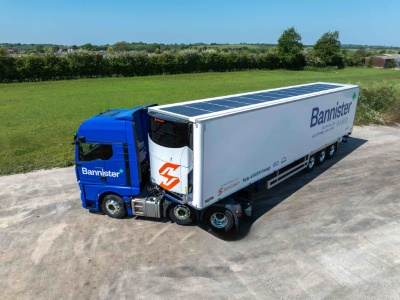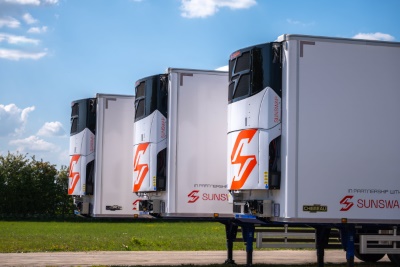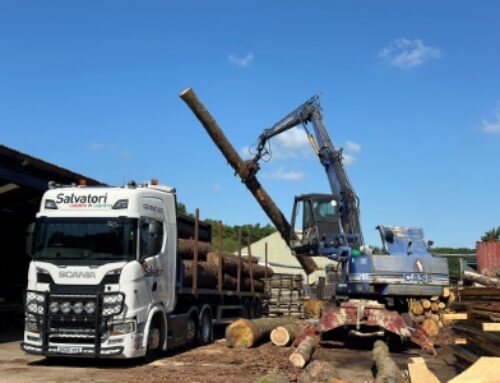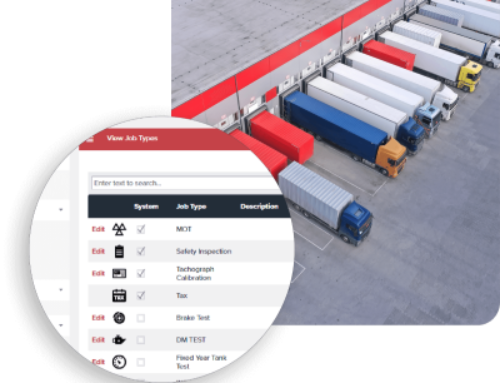Sunswap fridge units drive connected fleet for Bannister
 Worcestershire-based Bannister Transport has been benefiting from increased fleet oversight thanks to the connected technology incorporated in Sunswap’s battery and solar-powered Endurance trailer refrigeration units.
Worcestershire-based Bannister Transport has been benefiting from increased fleet oversight thanks to the connected technology incorporated in Sunswap’s battery and solar-powered Endurance trailer refrigeration units.
Carl Horsburgh starts his day differently from many transport managers. Instead of making calls to drivers scattered across the country, he opens his laptop and sees exactly what’s happening with every electric refrigerated trailer in Bannister’s fleet – including temperature readings from each compartment, battery levels, solar generation, door opening patterns and maintenance alerts.
“It gives me such a range of information, from how much solar power we’re pulling to the performance of the of the fridge itself, the fridge temperatures, compartment temperatures – it makes my job a lot easier,” said Carl.
According to Sunswap, while most transport fridges still operate like 1990s appliances with basic on/off switches – no connectivity, manual checks – Carl is able to manage his fleet like a 21st century operation.
“This is what happens when you build a better fridge from the ground up,” said Sunswap.
Instead of taking a diesel fridge and adding batteries, the firm designed the Endurance system as electric from day one – a single integrated unit powered by batteries in the unit with rooftop solar panels for extended range.
“This approach unlocks new capabilities. When every component speaks the same language from the start, the fridge becomes intelligent rather than just electric,” the company continued.
“Every Endurance unit generates over 1,000 data points covering refrigeration performance, energy consumption, location tracking, and component health. But data alone doesn’t help operators; it’s about what you do with it.
“Predictive diagnostics prevent breakdowns before they happen. The system identifies maintenance issues before failures occur, shifting operations from emergency breakdowns to planned service. Route-specific solar projections eliminate guesswork about energy requirements. Door opening patterns reveal efficiency opportunities invisible to conventional fridges.”
The software learns and improves continuously, says Sunswap, and over-the-air updates enhance efficiency without touching the unit.
“Each unit benefits from the collective operational experience of the entire connected fleet – performance improvements discovered by one operator automatically benefit all others. This creates maintenance simplicity, more time on the road, more utilisation – more time your trailer spends working for you.
“And with up to 81 per cent operational savings compared to diesel refrigeration units, you will want to make sure your Sunswap units are out every day saving you money.”
 The test of any refrigeration system is whether it works when it is needed most, says Sunswap, adding that its Endurance units deliver 24 hours’ frozen operation and up to two months’ chilled capability on a single charge. These aren’t theoretical claims, it says, but proven performance across diverse operations.
The test of any refrigeration system is whether it works when it is needed most, says Sunswap, adding that its Endurance units deliver 24 hours’ frozen operation and up to two months’ chilled capability on a single charge. These aren’t theoretical claims, it says, but proven performance across diverse operations.
For Carl at Bannister Transport, the operational impact was immediate. “Operationally, there is no difference at all,” he explained. “The biggest advantage is the fact that we are not putting 400 litres of diesel in every week.”
When multiplied across the year, says Sunswap, the numbers become substantial, as do the cost savings.
DFDS, which runs some of the UK’s longest refrigerated routes, saw this reliability firsthand, calling Endurance “the only feasible zero-emission refrigeration option” – in the words of its UK managing director, Matt O’Dell.
But perhaps the most telling validation came from an unexpected source, says Sunswap: “During Staples Vegetables’ first month using the Sunswap units this summer, they didn’t plug them in for charging. The units continued operating purely on solar energy for an entire month. This is setting a new standard for what is possible with transport refrigeration.
“The connected intelligence amplifies this reliability advantage. Real-time monitoring means issues get flagged before they affect cargo. Predictive maintenance prevents roadside failures.”












